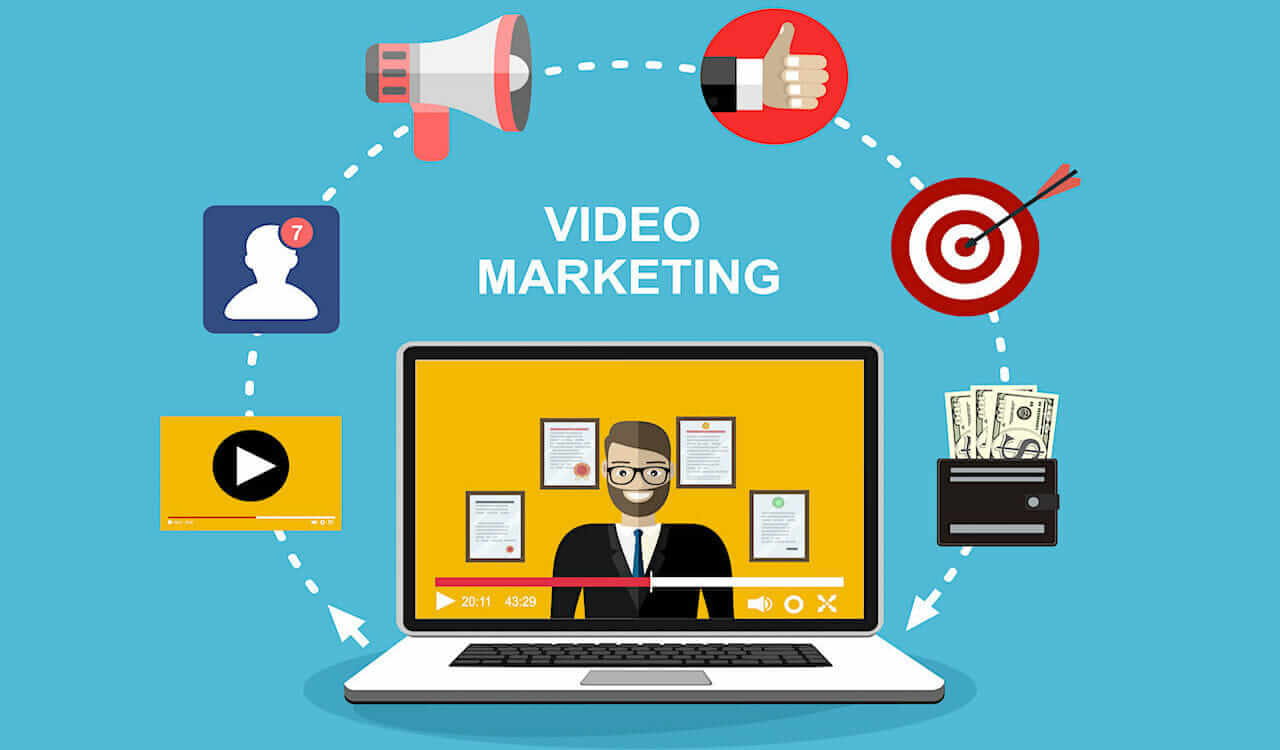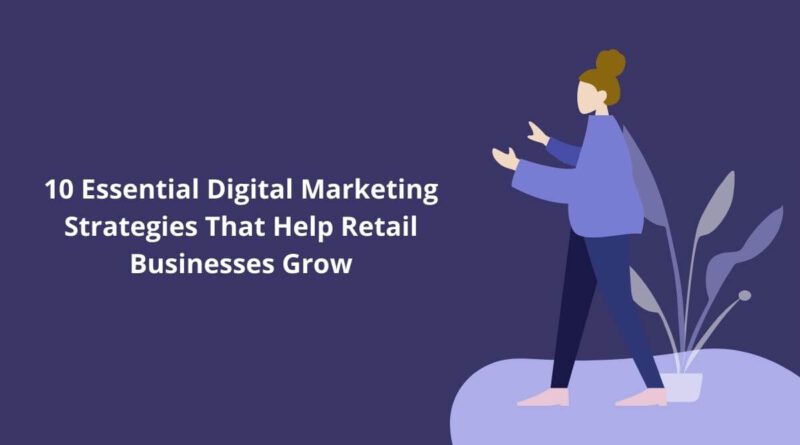10 Digital Marketing Strategies That Help Retail Businesses Grow
The idea behind owning a retail business is to see it grow. That would be the reason you opened one in the first place. Digital marketing can be effective in growing a retail business.
Table of Contents
What Is Digital Marketing?
Digital marketing is a system of marketing which uses online resources to ensure sales.
Different digital marketing strategies are suited for different businesses scenarios.
We‘ll be discussing ten functional digital marketing strategies for retailers.
A quick note of warning, though, these strategies are not quick hacks. You have to put in the effort and the needed resources before they would yield any results. There is no cookie-cutter strategy, a one-size fits all as all businesses have varying needs and goals. This is also because of the multiple variables involved in advertising. Therefore, a retailer must find methods that would work best for his/her business.
Facebook Ads
Facebook remains the biggest social media platform available. With over 70 percent of its users active daily, it is the perfect place to advertise your retail business and grow visibility within your locality. With Facebook Ads, you can boost your website to individuals in your vicinity.
Facebook is exceptional in targeting customers as it has a defined structure for accessing the importance of certain products to prospective clients based on their behaviors, interests, and even jobs.
Using Facebook Ads, you can send users straight to your website or your store which is an effective way to increase brand awareness.
Email Marketing
Email Marketing may be old, but it isn’t obsolete. Over 60 percent of mail users check their mails daily. That explains the potency of email marketing when utilized properly.
In email marketing, you reach out to people using their emails. One significant advantage of email marketing is that you can send different messages to different sets of people by creating tags based on user activities.
It is estimated that email marketing brings an average of $40 per $1 spent, making it one of the most effective digital marketing solutions.
You can use emails to reach out to customers to curb cart abandonment rates and rake in more income.
Social Media Marketing
Social Media is one big hub where you can engage people and market your retail business. There are many social media marketing platforms available.
These different platforms can be used by retail stores to boost their coverage and amplify growth. These platforms function differently. While Instagram is more image-based, Twitter works somewhat differently, as does Pinterest.
While it’s advisable to try out all these major platforms, it’s best to know which one suits your business the most. For example, if you are a B2B retail store, the best platforms for you would be LinkedIn and Twitter.
A B2C retail store would likely find more success on Instagram and Pinterest. Aside from function, these platforms also have their own audience and so using the right one for your business will help you target the right market.
Pay per click (PPC)
Pay per click is a digital marketing strategy that allows you to pay per ad clicked. There are many ways that PPC can be utilized, but the most common has to do with paid search ads. Advertisers have to bid on keywords in a bid to rank above retail competitors.
Whoever wins the bid owns the keyword. When this keyword is searched on the Google search engine, the owner’s ads are displayed with preference, thus ensuring a monopolized channel online for the retail store. In this strategy, you pay per click.
Content Marketing
Content Marketing involves publishing information to drive traffic to your site and drive sales as well. Examples are infographics, blog posts, videos, etc.
In essence, anything that can be used to lure users to your retail store or website. This is, however, not sales oriented. The idea is to solve people’s problems by giving them adequate and correct information. It is especially efficient if the solutions proffered are in line with the retail services offered.
If the potential customers find you reliable, they will keep coming back. Giving people the information they need can get them to trust you. They may go ahead to register to your mailing list and also subscribe to your blog or website, ensuring repeat customers for your retail business.
Search Engine Optimisation (SEO)
 Image source: agnisdesigners.com
Image source: agnisdesigners.com
SEO is one strategy that scares a lot of people away. However, if you can understand it, it is a great tool for retail businesses seeking growth.
While content marketing is great, it may not offer you much without SEO. With SEO principles utilized, search engines would understand your website better and help increase your retail store’s online visibility.
If search engine crawlers find it easy to read many pages on your website, you are more likely to appear in results for related queries. If your website or blog is well optimized, it will
- Rank higher on Google searches
- Function better and faster than other unoptimized sites
- Make your site user friendly to visitors. You would like to have them stay in your website and make decisions based on what they see, which will positively increase your conversion rate.
Affiliate and associate marketing
Affiliate and associate marketing can prove very potent if used correctly for retail businesses. Affiliate marketing involves the use of publishers on a commission basis.
These publishers are third party marketers that help direct customers to retail websites and stores based on agreed-upon scope. Their job is to refer prospective customers to your retail business.
If you are a retail store selling footwear, you can liaise with a merchant who makes footwear recommendations to a teeming population of footwear enthusiasts. All the merchant has to do is mention that you have fantastic footwear. Plus, there’s a possibility to pay the publisher based on the number of sales coming through his/her channel. Affiliate marketing is especially efficient for retail businesses that are product specific.
Retargeting Ads
Retargeting is quite simple. It entails reaching out to leads that failed to convert. When you use Retargeting Ads, this is what happens. The user comes to your retail store but leaves without buying (conversion).
Such users are noted by a specialized program (mostly pixel). Whenever they are online again, your Retargeting provider sends the ads in a bid to lead them back to your retail website. This is a good strategy since it puts your retail store in the face of your prospective clients again, limiting cart abandonment cases and ensuring more effective conversion of leads.
Video Marketing

Image source: singlegrain.com
Video Marketing is becoming a major force within digital marketing spheres, especially for retail businesses. Since most people find it challenging to read the text, it only makes sense to communicate visually.
The dynamism that retail store owners can leverage video advertising offers. Consider watching a video of how a new product works compared to reading a blog post on it. One is way more comfortable and fun as you see the product being advertised in real-time.
Videos can be used for brand awareness which makes it especially effective for retail businesses. Plus, with today’s technology, video production and marketing need not be highly expensive. Having catchy messages or phrases, dynamic product shots, and captivating storyline definitely will leave a lasting impression to the business’ customers.
Influencer Marketing
Influencer Marketing involves liaising with celebrities, influential people, or authorities within your retail business scope and your locality.
These people have a large following and can help create the required awareness of your retail business. Doing this lends credibility to your products and services as these people are endorsing your products, thereby promoting sales and helping your retail business grow.
This could help you cover more ground and grow your business with ease as you ride on the popularity of an Influencer within your locality.
Which strategy is the best?
Picking one strategy above other digital marketing strategies is not wise nor practical. This may be attributed to the differing strengths and weaknesses of each strategy. For instance, you can join a trend on Twitter; you can’t do that on Pinterest. Also, your pictures would fare better on Instagram and Pinterest than on Facebook.
In the long run, you would have to find out what works for your retail business and what doesn’t. Most of the time, it takes a combination of these strategies to achieve the needed growth.
Conclusion
Digital marketing strategies is an extensive methodology. Its borders are widening every day. To leverage on its potentials, it would involve a lot of trials, patience, and perseverance. Remember, it’s not a quick fix. It would require your time and resources, and if done well, digital marketing could change your retail store forever.




